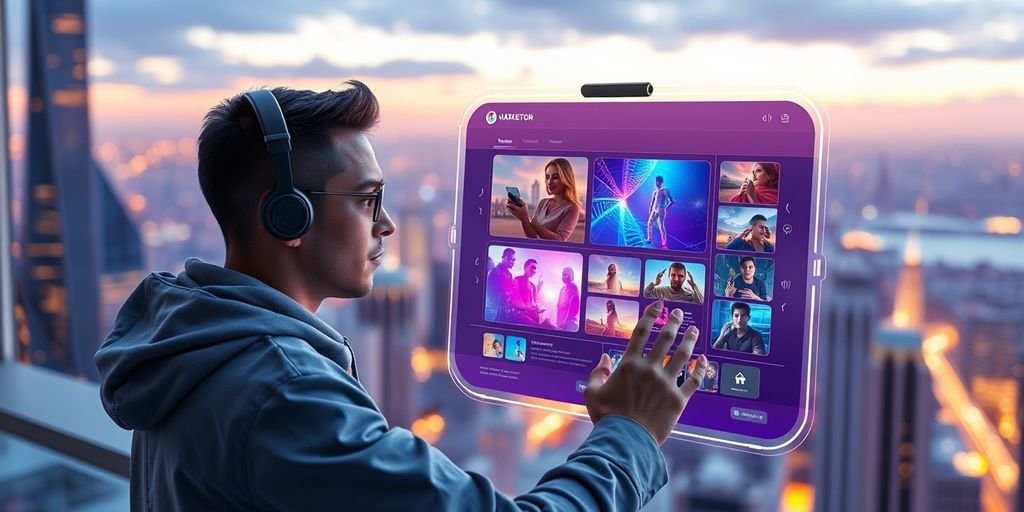In the realm of content creation, Generative AI stands as a revolutionary force, reshaping how businesses approach marketing and brand communication. By leveraging the latest advancements in artificial intelligence, companies can now produce content that is not only high-quality and consistent with their brand voice but also tailored to specific marketing strategies and audiences. As we delve into the transformative role of Generative AI in content creation and the future landscape of marketing, it becomes evident that embracing these emerging tools is crucial for staying competitive in today’s fast-paced digital environment.
Key Takeaways
- Generative AI is transforming content creation by enabling businesses to automate and customize high-quality content, aligning with their brand’s voice and marketing goals.
- The integration of Generative AI into marketing strategies offers a competitive edge through enhanced personalization, efficiency, and the ability to generate innovative content ideas.
- The future of marketing with Generative AI promises continued innovation, with industry-specific solutions and data-driven insights leading to more effective and engaging campaigns.
The Transformative Role of Generative AI in Content Creation
Understanding Generative AI and Its Content Capabilities
Generative AI is revolutionizing the way we think about content creation. At its core, it’s a system that leverages algorithms to generate new content from scratch, including text, images, and audio. This technology is not just about automating tasks but about fostering creativity and producing outcomes that were once solely the domain of human ingenuity.
One of the most compelling applications of generative AI is in customized content creation. Tools like ChatGPT and Synthesia are at the forefront, generating human-like text and videos based on user prompts. These tools are constantly evolving, becoming more sophisticated and requiring less human oversight. However, with great power comes great responsibility, and there are ethical considerations to bear in mind, such as the risk of generating unethical content or misusing sensitive data.
The transformative potential of generative AI is immense, offering businesses the ability to create highly personalized and engaging content at scale. Yet, it’s crucial to navigate the challenges that come with it, including the need for significant computational resources.
Here’s a glimpse at some of the top generative AI tools that are redefining content creation:
- Synthesia
- Bardeen
- Generated.photos
- Rephrase.ai
- Descript
- Murf.ai
- Designs
As we continue to explore the capabilities of generative AI, it’s clear that its impact on content creation is just beginning. The future promises even more advanced models that will further enhance the authenticity and effectiveness of AI-generated content.
Customizing Brand Voice with AI-Driven Content Tools
In the dynamic world of content creation, AI-driven tools are revolutionizing the way brands communicate. These tools enable businesses to establish a consistent and customized brand voice across various platforms. For instance, platforms like HubSpot and Planoly are introducing features that allow for the customization of content to match a brand’s unique style. With AI, the process of tailoring content becomes not only more efficient but also more sophisticated, as the AI learns and adapts to the nuances of a brand’s communication strategy.
The recent trend towards personalization in marketing has seen AI tools offering solutions that go beyond mere text generation. They now include capabilities for creating personalized videos and interactive experiences that resonate with individual consumers. This level of customization is crucial for businesses aiming to stand out in a crowded digital landscape.
The integration of AI in content creation tools is a testament to the technology’s potential to enhance brand identity and consumer engagement.
While the technology is still in its early stages, the impact of AI on content creation is undeniable. Businesses that leverage these tools effectively can expect to see significant improvements in their marketing efforts.
Enhancing Marketing Strategies with Generative AI
Generative AI is revolutionizing the way businesses approach marketing strategies. By leveraging the power of AI-driven content creation, companies can produce personalized and engaging content at scale. This not only enhances the customer experience but also streamlines the marketing workflow, leading to increased efficiency and effectiveness.
One of the most significant applications of Generative AI in marketing is the development of customized campaigns. These campaigns can be tailored to individual preferences and behaviors, ensuring that each customer feels uniquely addressed. The table below showcases some of the key ways marketers are utilizing Generative AI:
| Use Case | Description |
|---|---|
| Personalized Messaging | Tailoring content to individual customer profiles. |
| Predictive Analytics | Anticipating customer needs and trends. |
| Ad Content Creation | Generating engaging ad copy and headlines. |
Generative AI tools are not just about automating tasks; they’re about creating opportunities to connect with customers on a deeper level. The technology is constantly evolving, offering businesses new ways to captivate and convert their audience.
As we look to the future, the role of Generative AI in marketing is poised to grow even more significant. From Google’s auto-ad creation to advanced predictive models, these tools are becoming indispensable for crafting effective marketing plans and strategies. Staying informed about the latest Generative AI tools and trends is crucial for businesses aiming to maintain a competitive edge.
The Future Landscape of Marketing with Generative AI
Innovations in AI-Generated Models and Their Marketing Impact
The marketing and advertising landscape is witnessing a significant transformation with the advent of generative AI models. These models are not just enhancing creativity but are also streamlining the entire content creation process. For instance, Google’s generative AI has been at the forefront, showcasing the ability to autonomously create engaging advertisements using deep learning technologies.
One of the most recent and notable developments in this field is Adobe’s foray into generative AI. Adobe has developed its own AI models with a commitment to responsible innovation. The company plans to apply its learnings to ensure that the integration of third-party AI technologies aligns with ethical standards. This move by Adobe is indicative of the industry’s shift towards more responsible and innovative use of AI in marketing.
The potential of generative AI in marketing is vast, with applications ranging from hyperrealistic deepfakes in advertisements to the creation of entire marketing campaigns. As these tools become more sophisticated, they promise to deliver highly customized content with minimal human intervention.
As we look to the future, the advancements in AI-generated models are expected to improve not only the accuracy and realism of content but also the efficiency of ad targeting. This evolution in AI capabilities is poised to revolutionize the way businesses engage with their audience, offering unprecedented levels of personalization in marketing strategies.
Generative AI: A Catalyst for Industry-Specific Marketing Solutions
The collaboration between Accenture and Adobe to co-develop industry-specific generative AI solutions marks a significant milestone in the marketing landscape. This partnership aims to harness generative AI’s potential to deliver personalized experiences that resonate deeply with customers. The initiative underscores the growing trend of tailoring generative AI tools to meet the unique demands of different industries, from healthcare to retail.
Generative AI’s role in marketing is rapidly evolving, with a focus on creating highly targeted and engaging content. For instance, Google’s generative AI has demonstrated remarkable capabilities in auto-ad creation, utilizing complex data and deep learning technologies to craft compelling narratives.
The promise of generative AI in marketing extends beyond mere content generation; it offers a transformative approach to customer engagement, enabling businesses to communicate with individuals in a more meaningful and relevant manner.
Here are some ways generative AI is revolutionizing industry-specific marketing:
- Personalizing customer interactions with dynamic content
- Streamlining the creation of ad copy and product descriptions
- Enhancing predictive analytics for more effective campaign strategies
As generative AI continues to integrate with natural language processing and machine learning, the future of marketing looks increasingly sophisticated. Businesses that stay informed about these advancements can leverage them to stay ahead in a competitive market.
Embracing Generative AI: Insights and Statistics
The integration of Generative AI into marketing strategies has become a pivotal trend, with businesses leveraging its capabilities to create highly personalized and engaging content. AI-driven marketing campaigns can produce personalized content, tailoring messages to specific demographics, from product recommendations to personalized emails, thereby enhancing customer experience and engagement.
Recent statistics reveal a surge in the adoption of Generative AI tools across various industries. The table below highlights the percentage increase in the use of Generative AI for content creation in key sectors over the past quarter:
| Industry | Q1 Increase (%) |
|---|---|
| Retail | 12.5 |
| Finance | 9.8 |
| Healthcare | 11.3 |
| Technology | 14.2 |
The potential of Generative AI extends beyond mere content generation; it is reshaping market dynamics, fostering innovation, and setting new benchmarks for creativity and efficiency.
As the technology matures, it is crucial to understand the best practices for its use. This includes recognizing the importance of data quality, ethical considerations, and the need for human oversight to ensure that the output aligns with brand values and customer expectations.
Harnessing the Future of Generative AI in Content Creation
As we have explored throughout this article, generative AI is not just a fleeting trend but a transformative force in the realm of content creation. From crafting personalized marketing materials to generating innovative ideas, the capabilities of generative AI tools are reshaping the way businesses approach their creative processes. With the potential to enhance productivity, maintain brand consistency, and unlock new levels of creativity, these tools offer a competitive edge in a rapidly evolving digital landscape. As the technology continues to advance, staying informed and adaptable will be key for businesses looking to harness the full power of generative AI. The future is bright, and the possibilities are, indeed, endless.
Frequently Asked Questions
What are the latest trends in Generative AI for content creation?
One of the latest trends in Generative AI for content creation is the development of tools that can generate highly personalized and brand-specific content at scale. Innovations such as AI-driven design platforms, advanced language models for writing assistance, and AI-generated audio and video content are becoming increasingly sophisticated, enabling businesses to create unique and engaging experiences for their audiences.
How can businesses implement Generative AI in their marketing strategies?
Businesses can implement Generative AI in their marketing strategies by using AI to generate content ideas based on keywords or topics, crafting social media posts, writing product descriptions, and creating engaging blog content. Generative AI can also be used to personalize website experiences and automate the production of marketing materials, ensuring consistency with the brand’s voice and style.
What industries can benefit from using Generative AI?
Generative AI has the potential to benefit a wide range of industries, including marketing, entertainment, healthcare, and education. Marketers can use it to create personalized content, while the entertainment industry can generate new forms of media. In healthcare, Generative AI can assist in medical research and data analysis, and in education, it can create customized learning materials and interactive experiences.



